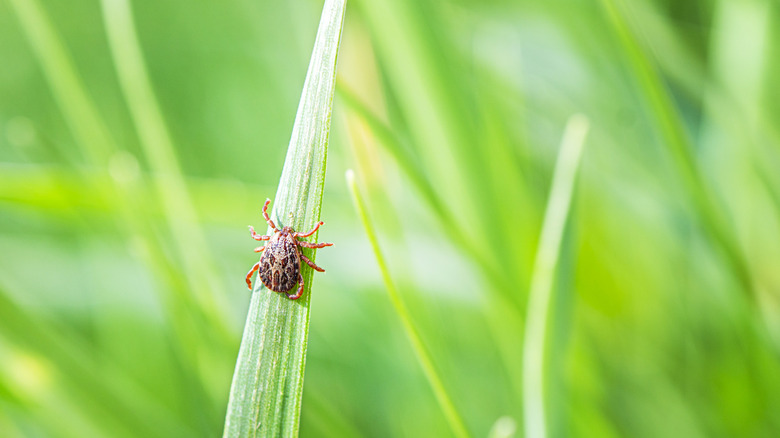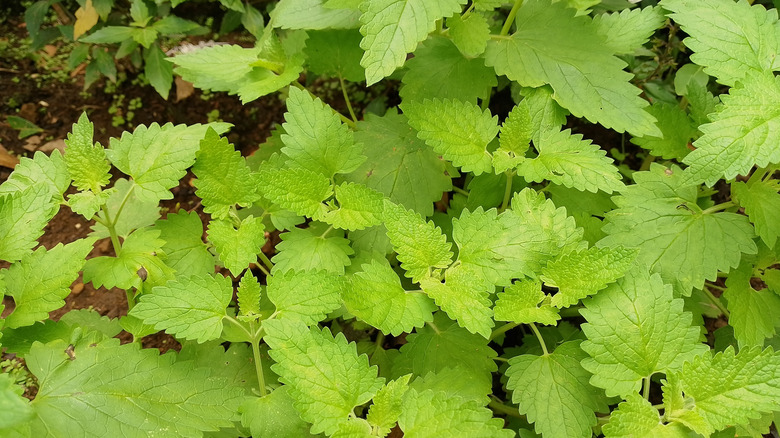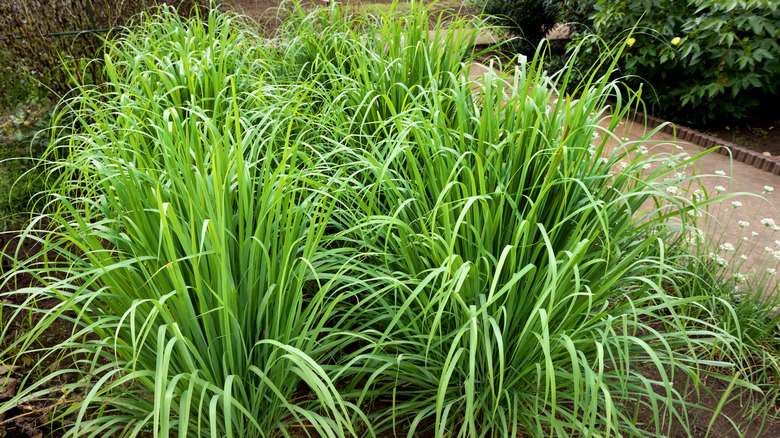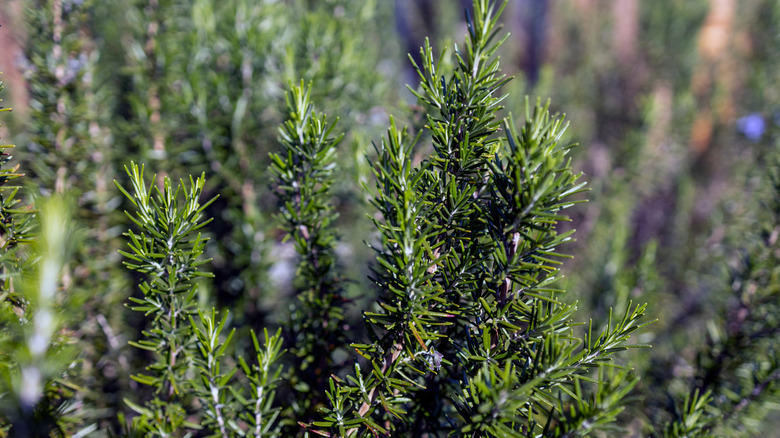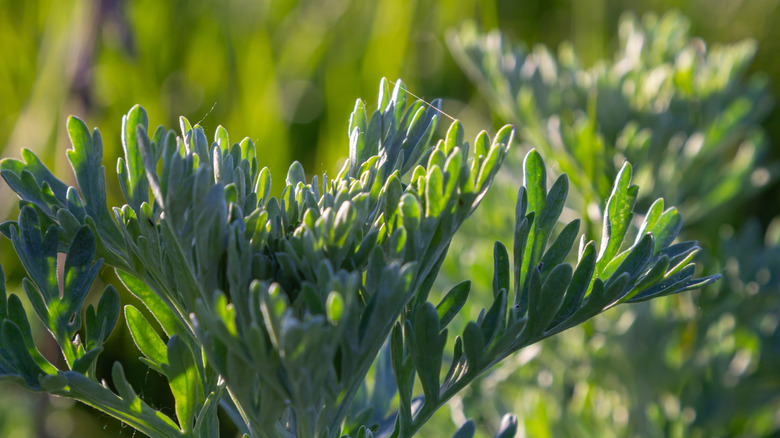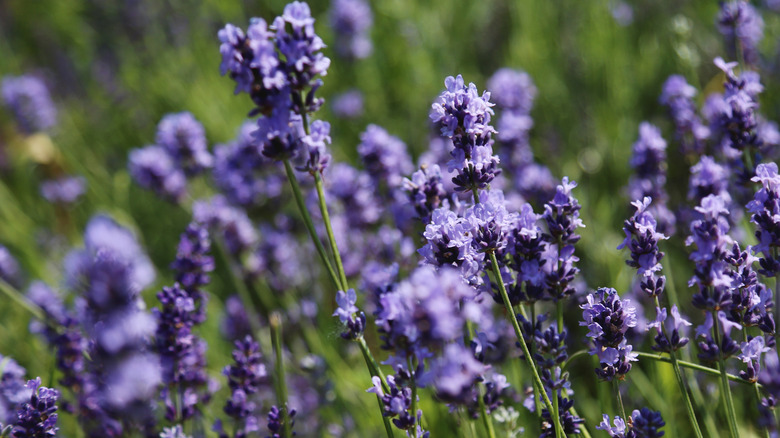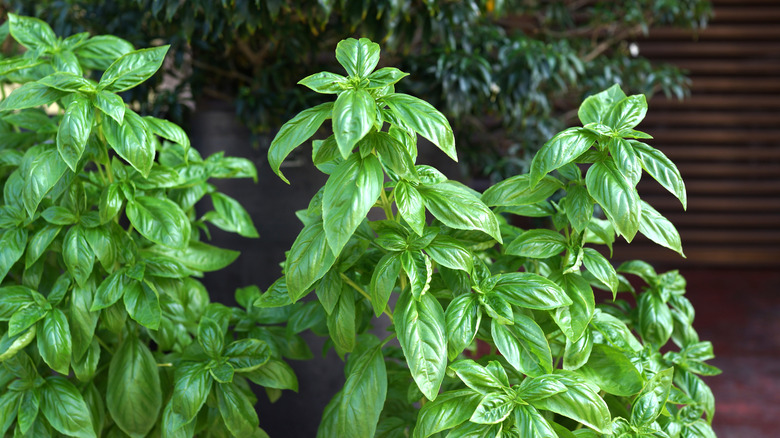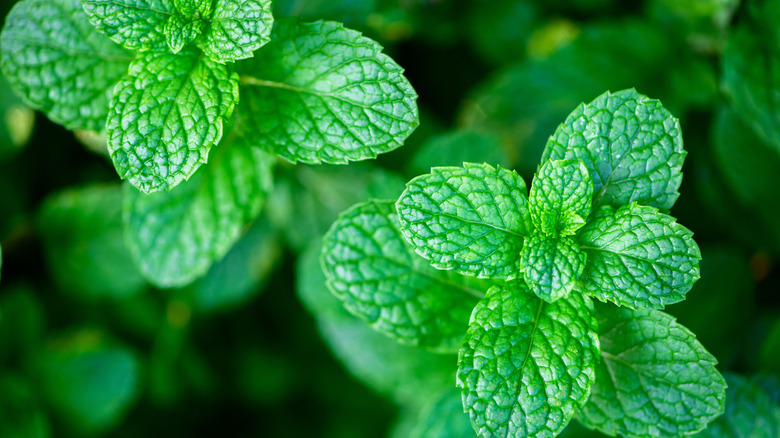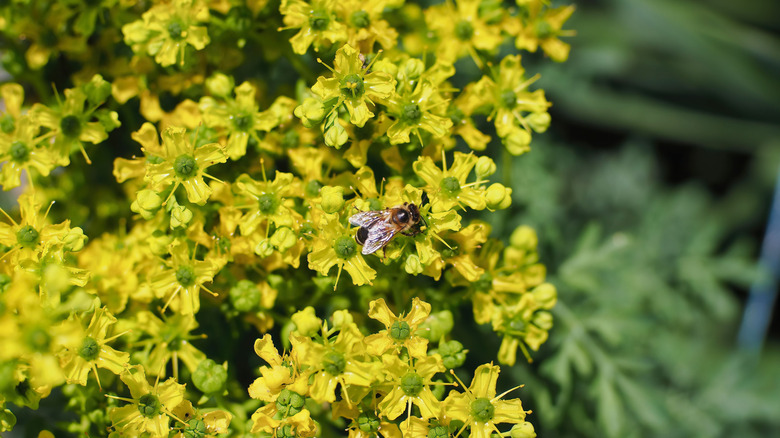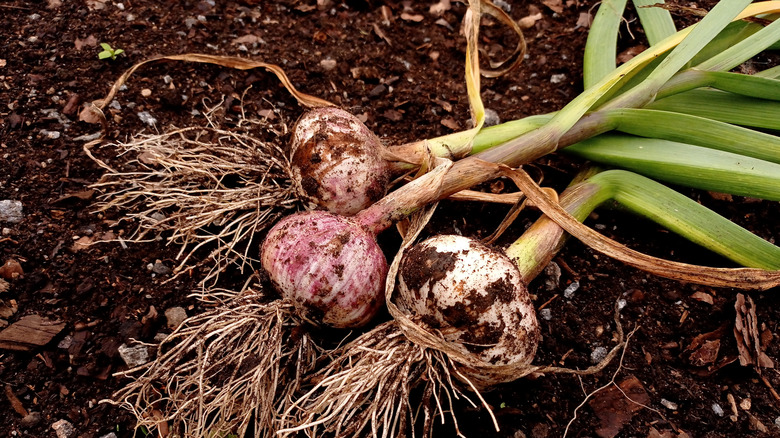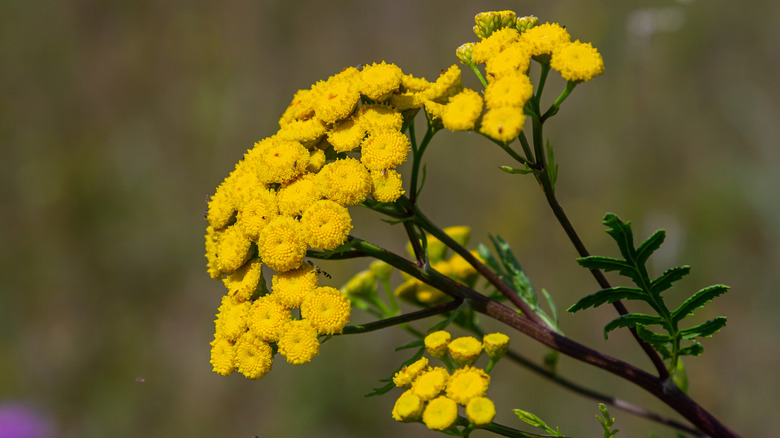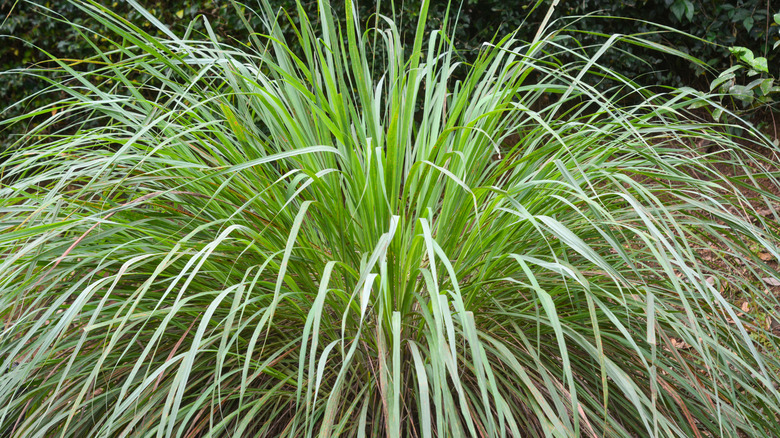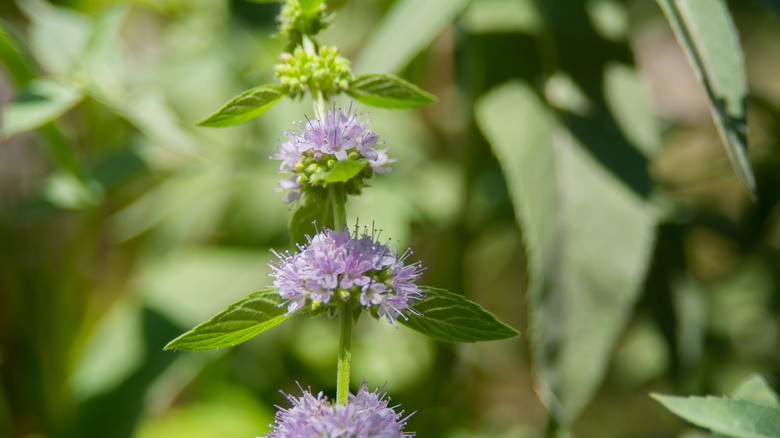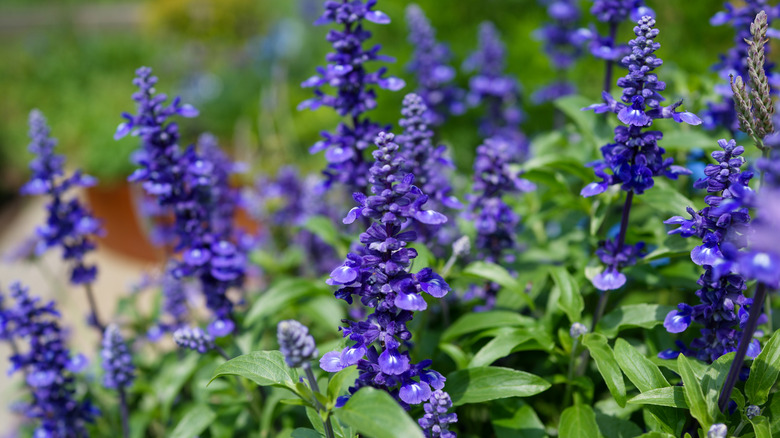18 Plants That Keep Ticks Out Of The Yard
We may receive a commission on purchases made from links.
A pleasant day spent outside can quickly turn into a nightmare if you are bitten by a tick. If you want to keep ticks out of the yard, planting certain species may do the trick. While no plant is a sure-fire deterrent against ticks, there are multiple plants that have the ability to repel them from your yard. Many feature strong aromas that affect the ticks' ability to detect hosts, such as humans and pets, using their sense of smell. You may recognize some of these plants for their ability to keep away insects, such as mosquitoes. Ticks are not insects (they're arachnids) but researchers commonly find the same efficacy as insect repellents for many of these species.
Ticks live throughout the United States. Many can transmit serious illnesses such as Rocky Mountain fever and Lyme disease. Creating a tick-repellent garden is one crucial step to ensuring you have a healthy, safe backyard for your family and pets. Doing it alongside other mitigation steps to stop ticks from taking over your lawn is best for active prevention. As you add any of these plants, also make other changes to reduce chances of a tick encounter. Adding a mulch barrier around the perimeter of your yard, trimming your grass, and pruning overhanging branches to introduce more sun can all make a big difference. As a bonus, many of these plants can attract pollinators to your yard and fill it with a glorious scent. They can also add a bright dash of color, all the while helping you mount a defense against the bothersome tick. Most require full sun and well-drained soil, unless otherwise noted. If ticks are driving you up the wall, these plants can help.
Catnip drives cats wild and ticks away
If you want a plant that will make your cat happy while deterring ticks, try adding catnip (Nepeta cataria) to your garden. Rich in an active chemical called nepetalactone, the weedy herb is a promising tick repellent. Studies are still underway ongoing, but researchers find that nepetalactone can offer similar performance for tick repelling as DEET. Adding catnip to your yard might bring in a few neighborhood cats for a grazing session, but it can also welcome bees when it flowers while sending ticks running the other way.
Ticks sour on lemongrass
Lemongrass' (Cymbopogon spp) lemony scent may thrill cooks, but ticks are among the pests repelled by lemongrass. Acadia University researchers discovered using lemongrass oil may repel ticks and interfere with their ability for detecting potential hosts' chemicals. Ticks navigate heavily by scent, so introducing anything confusing their navigation system can be helpful in keeping them away. You can grow lemongrass as an annual in cooler areas, and as a perennial in warm, humid spots like Florida. Keep in mind this is an aggressive grower, and can quickly take over without proper management.
Rosemary is nothing sweet to ticks
Rosemary (Salvia rosmarinus) serves your yard as an ornamental, pollinator attractor, and fragrant floral. Lyme disease experts recommend planting it to repel ticks thanks to its slight mint-pine scent. Promising studies show that rosemary features three molecules that can drive ticks away as efficiently as DEET. The plant's essential oils of cineole, camphor, and borneol also do the trick. Rosemary grows quickly with a minimum of six hours in full sun. It doesn't require much water and doesn't like frequent watering, whether used as a ground cover or container plant.
Oregano makes ticks say oh no
The culinary herb, oregano (Origanum), is a must-have in your tick repellent garden. In addition to the savory flavor it packs, this herbaceous perennial features scents the pests hate. One experiment found significantly fewer ticks on a blanket treated with oregano oil, letting scientists conclude 5% oregano oil may be as effective as 20% DEET. Like other fragrant herbs, oregano's scent likely overwhelms the tick's scent receptors so they avoid it. Growing leafy oregano requires full sun, with well-drained soil or dry soil. Expect growth of 6 inches to 3 feet in size.
Wormwood may cause ticks to worm their way out
A plant that sounds like it's from a fantasy novel, wormwood (Artemisia absinthium L) does double duty. First, it's often avoided by popular tick hosts like deer and wild mice because it features the compound absinthin. As for the ticks themselves, they also dislike the compound and may steer clear of anywhere it grows. You can grow it in full to part sun, but you may want to avoid planting in the Midwest, where it's considered a noxious weed. Take caution around wormwood with pets, because it can be toxic when ingested.
Lavender's sweet scent is terrible to ticks
Lavender (Lavandula angustifolia), also known as true lavender, not only helps your garden or yard smell amazing, but it also repels ticks. Studies show lavender's essential oils may repel them as effectively as DEET. Lavender's power is that it contains linalool, a compound commonly used in insect repellent. Upon exposure, linalool affects ticks' nervous system so they stay away. You can showcase lavender's fragrant flowers in a container or as a border to get the great effects. Be careful planting lavender as it's toxic to pets.
Ticks don't consider basil basic
The next time you feel the need to whip up some pesto, you might deter ticks in the process when growing basil (Ocimum ssp.) Basil contains linalool as well as eugenol, a common compound used in natural tick remedies to repel ticks, both adults and larvae. The most commonly-grown basil is sweet basil and it's very easy to grow, requiring soil with good drainage and bright light for six to eight hours a day. This herb thrives both in the garden and in containers.
Peppermint isn't minty fresh to ticks
A cross between watermint (Mentha aquatica) and spearmint (Mentha spicata), the oil of strongly-scented peppermint (Mentha x piperita) has a notable effect on ticks. Try growing it in the yard to deter ticks as the potent aroma may keep them away. Peppermint contains menthol, the same compound as another popular way to repel ticks naturally with an item from your medicine cabinet, Vicks VapoRub. It grows aggressively, however, so plant in a pot that's 12 to 16 inches or keep regularly trimmed, using the leaves for fresh peppermint tea.
Rue will make ticks rue the day they entered the lawn
Rue (Ruta graveolens) is a pretty, small shrub with multiple benefits. Sometimes called herb of grace, it's considered deer resistant, so the mammals may steer clear of your yard, reducing chances of visiting ticks. As an ornamental, it's prized for its yellow blooms, while also repelling pests, such as ticks, and attracting pollinators. Use caution and wear gloves when handling, however, to avoid skin irritation. Rue has a medium poisonous factor, so be careful planting it around pets as it's toxic and may be fatal when consumed in large amounts.
Thyme tells ticks think it's time to move on
Thyme is another mint family member worth planting to keep ticks out of the yard. You can grow it as a "carpet," so the leaves release their scent when walked on to make ticks avoid it. Thymol, a key compound in thyme, has been used as a natural agricultural pest repellent. Low-maintenance and easy to grow, thyme can tolerate periods of little to no moisture, provided its soil is well-drained. Once it's established, you'll also have a savory plant you can use in culinary creations.
Garlic can ward off the vampires of the yard
Ticks are sort of like vampires with their blood-sucking capabilities, so logically, you can plant garlic (Allium sativum) to keep away ticks! They hate the scent, and studies of Swedish marines saw promising use in humans, with a noted reduction in bites among participants who ate garlic versus those who had a placebo. Often grown as an annual, it likes full sun and organic, rich soil with good drainage.
Tansy isn't tantalizing to ticks
A popular medicinal herb, common tansy (Tanacetum vulgare) grows like a fern and produces yellow flowers, quickly brightening your lawn. Tansy features a series of compounds, including lpha-pinene, beta-pinene, pinocamphone, 1,3,3-trimethylcyclohex-1-ene-4-carboxaldehyde, and 1, 8-cineole, in its flowerheads. All of these compounds have shown promising results against ticks. Give it well-drained, ideally dry, soil, and full sun to partial shade. It's highly toxic and must be kept away from any pets and children. In addition, it can disturb native plants and self-seeds, so plant carefully.
Geranium makes ticks journey away
The classic garden favorite, geraniums (Pelargonium) are rich with the compound (-)-10-epi-γ-eudesmol, which researchers found has high capabilities for repelling ticks. Plus, while you may love the smell of geraniums, ticks don't, so they should steer clear. You can enjoy these repellent properties when you ensure the geraniums have six hours of sun daily. Whether planted in a garden bed or decorating a container, geraniums will add a sunny burst of color to your home. Keep them away from pets, as the flowers are toxic to cats and dogs.
Citronella isn't just for mosquitoes
You may know citronella (Cymbopogon nardus) for mosquito-repelling properties, but ticks will deter from it as well. Citronella oil is prevalent in pesticides, because it masks the smell of targeted hosts, making it harder for the pests to locate them. Thanks to its compound β-citronellol, citronella may be an effective tick repellent. Upon the brushing of its leaves, citronella releases its lemony scent and aromatic compounds, sending these pests packing. You can grow this low-maintenance plant as a perennial in USDA Zones 9-11 and an annual elsewhere. It's drought-tolerant and loves full sun.
Pennyroyal offers ticks a royal goodbye
Long used as an ancient medicine, pennyroyal (Mentha pulegium) is a creeping plant in the mint family commonly used for repelling ticks. A compound called pulegone is thought to be the key, which pennyroyal emits with its scent. Pulegone is a neurological toxin to insects and likely to ticks, causing them to stay away from your yard. It's easy to grow, needing only full sun and moist soil. Use caution planting pennyroyal if you live within a wetland area. It's an aggressive grower with the potential for displacing native species.
Ticks scurry from sage
A member of the mint family, Sage (Salvia officinalis) boasts a powerful smell when crushed that may keep away ticks, thanks to the plant's aromatic compounds of camphor, thujone, and cineole. Camphor, in particular, is the same ingredient in some natural tick repellent sprays to ward them off. Hardy in USDA Zones 4 through 8, sage grows best in full sun. When it's not steering away ticks, it can add some delicious flavor to poultry dishes.
Chrysanthemum don't having ticks staying mum
Chrysanthemums, or mums, are a fall mainstay. But did you know they do more than just decorate your home's exterior with brilliant vibrant color? Mums feature pyrethrin, a natural pesticide commonly used in insect repellents. The pyrethrin has a strong neurological effect on pests, paralyzing them until they eventually die. They're easy to grow, quickly flourishing in the garden or container. The diverse range of chrysanthemums lets you add a rainbow of colors to your landscape, and you may grow them as an annual or perennial, depending on your location.
Pampas grass doesn't make ticks feel pampered
Pampas grass (Cortaderia selloana) is an ornamental grass from South America with a fluffy appearance. Because of its native region, it features very low water needs and is a popular plant in xeriscaping. Adding pampas grass to your yard lets you have a flourishing grass plant without the need for constant watering. The dry conditions don't give ticks the moist, shaded environment they like, however, so some homeowners plant it as a deterrent. However, since it's considered invasive in some areas, such as California, check your local guidelines before planting.
